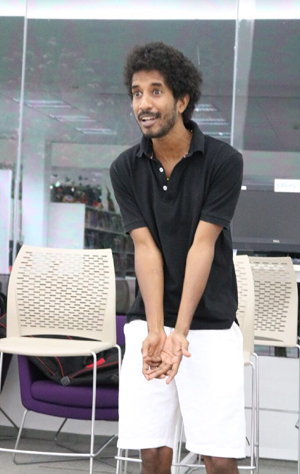Sashane and audience tackle sensitive subject with delicacy and humour

Moving portrayal: Rajinda Jayasinghe
Tackling depression and suicide within the realm of theatre is such a tricky task as it requires great delicacy, dignity, and empathy.
All three elements are present in Duncan Macmillan’s fantastic play ‘Every Brilliant Thing’ which saw itself being performed at various Fringe festivals across the UK and even garnered its own HBO film.Given the recent statistics on Sri Lanka’s suicide rates in the world, performing this show here is not only timely but a necessity. Why? Using the arts as a medium to discuss mental health not only kick-starts conversations but assists in breaking down taboos surrounding depression and suicide.
Over the past couple of years, Sashane Perera has directed a range of shows from large scale productions (Jean Paul Sartre’s ‘Men Without Shadows’ in 2014) to smaller, more intimate pieces (Duncan MacMillan’s ‘Lungs’ in 2016). Like ‘Lungs’ which featured only two actors in a minimalistic space, ‘Every Brilliant Thing’ is performed by only one character with next to nothing in the way of a set making it a show which can be performed anywhere. The British Council library isn’t a conventional theatre space so there’s not a lot you can do, production wise. Instead the show compensated by featuring an array of jazz and soul music (Billie Holiday, Ray Charles), adding a nice touch to the story where the protagonist bonds with his father over records. In fact, for this show all you need really is an enthusiastic audience. But more on that later.
‘Every Brilliant Thing’ centres on a man whose mother experiences depression and attempts suicide multiple times. In an attempt to change his mother’s mind he begins listing every brilliant thing in this world (‘stripes’, ‘staying up past your bedtime’, ‘peeing in the sea and nobody knowing’) and what begins as a sweet gesture, turns into something which continues for a couple of decades as the list gets longer and longer. Ebullient, energetic and thoughtful, Rajinda Jayasinghe did a pretty phenomenal job of handling this role and recounting the story of the list. Smoothly transitioning back and forth between being an adult and being an adolescent or a teenager, the play felt less like a performance and more a conversation, thanks in part to his knack for storytelling. Deeply affected by his mother’s depression, he captured the frustration of not being able to help her despite his best efforts. Thus, the play not only nails what it’s like to process suicide at different ages but attempts to understand how depression works and what it’s like to see someone go through it.
While it would be easy to call this a one-man show it actually relied heavily on audience participation. Upon entering the space some audience members were handed cards with one brilliant thing written on it, to be read out when their number was called. Taking it one step further, some audience members were roped into the performance acting as the vet, the father, the school counsellor, and the protagonist’s wife. Sometimes it turned into an improv game where lines of dialogue were essentially constructed by the audience member and Jayasinghe responded however he wanted to. The fact that most of the audience members were non-actors must have proved a challenge for Jayasinghe – how do you deal with non-actors who are reluctant to act, how do you make them feel at ease onstage, what decisions will you make based on what they say? It’s what makes this play so engaging because you don’t know what will happen.
On the night I opted to see the show, all participants were game and actually, produced some of the best moments of the show. Upon bringing his ‘father’ up to make a speech at his wedding, the participant remarked “I’m a man of few words….and I’m running out of words”. Later on he said “I hope you two will be as happy as your mother and I have been”. It’s a simple line but complex given what the family have gone through thus far. Later on when the protagonist himself is dealing with issues, he rings up his counsellor and asks to speak to the sock puppet she used as a means of communicating with students. It’s interesting how the script leaves the imperative questions up to the participant – “Was I always like this?” The ‘counsellor’ responded affirmatively and when the protagonist thanked her and said he would not call again she replied, “You can call me anytime”. It’s a sweet gesture, but it’s also very indicative of human nature and empathy; a moment which shouldn’t go unrecognised.
One left the play not only in a state of reflection but also overwhelmed by how great the entire production was. Perera’s overall direction gave it a humorous tone that complimented Jayasinghe’s performance which came across not as preachy but instead, relatable and quietly moving. I do hope that this play generates a conversation and I look forward to seeing Perera’s next directorial venture which I believe will be the Tony award-winning musical, ‘Fun Home’.
Every Brilliant Thing was staged at the British Council and at the Lakshman Kadirgamar Institute


